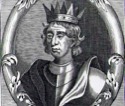Snyder Family 2016 - Person Sheet
Birthabt 982, Normandie, France
Death6 Mar 1052, Winchester, Hampshire, England
FatherRichard I "Sans Peur" , Duke of Normandie (933-996)
MotherGunnora (Gunhilda) De Crêpon (936-~1029)
Spouses
Birthabt 968
Death23 Apr 1016, London, England
Death Memoage 48
BurialSt. Paul's Cathedral, London, England
FatherEdgar I "The Peaceable" King of England (~934-975)
MotherElfrida (Elfthryth) , Queen Of England (-965)
Marriage1002, Normandie, France
ChildrenGoda (Godgifu) (~1004-~1055)
Edward II “The Confessor” (~1004-1066)
Notes for Æthelred II "The Unready" (Spouse 1)
also spelled: Ethelred or Aethelred II "The Unready", King Of England
d. 23 Apr 1016, London, England, Age: 48
br. St.Paul's Cathedral, London, England
ÆTHELRED II, the UNREADY
(978-1016 AD)
He succeeded to the throne after the murder of his half-brother, Edward II, the Martyr, at the age of ten. His reign was plagued by poor advice from his personal favorites and suspicions of his complicity in Edward's murder. His was a rather long and ineffective reign, which was notable for little other than the payment of the Danegeld, an attempt to buy off the Viking invaders with money. The relentless invasions by the Danish Vikings, coupled with their ever-escalating demands for more money, forced him to abandon his throne in 1013. He fled to Normandy for safety, but was later recalled to his old throne at the death of Svein Forkbeard in 1014. He died in London in 1016.
Ethelred
Edgar's sudden death at the age of 33 led to a succession dispute between rival factions supporting his sons Edward and Ethelred. The elder son Edward (reigned 975-978) was murdered in 978 at Corfe Castle, Dorset, by his seven year old half-brother's supporters.
For the rest of Ethelred's reign (reigned 978-1016), his brother became a posthumous rallying point for political unrest; a hostile Church transformed Edward into a royal martyr. Known as the Un-raed or 'Unready' (meaning no counsel, or that he was unwise), Ethelred failed to win or retain the allegiance of many of his subjects. In 1002, he ordered the massacre of all Danes in England to eliminate potential treachery.
Not being an able soldier, Ethelred defended the country against increasingly rapacious Viking raids from the 980s onwards by diplomatic alliance with the duke of Normandy in 991 (he later married the duke's daughter Emma) and by buying off renewed attacks by the Danes with money levied through a tax called the Danegeld. The Anglo-Saxon Chronicle in 1006 was dismissive: 'in spite of it all, the Danish army went about as it pleased'. By 1012, 48,000 pounds of silver was being paid in Danegeld to Danes camped in London.
Eventually, in 1013, Ethelred fled to Normandy when king Sweyn of Denmark dispossessed him. Ethelred returned to rule after Sweyn's death in 1014.
Ethelred's son Edmund set himself up as an independent ruler in the Danelaw. After Ethelred's death in 1015, Edmund cleared southern England of Danish marauders in a series of fiercely fought and highly mobile fighting, but he lost the battle of Ashingdon of 1016 (his Mercian allies deserted him) against Sweyn's son Canute, and died in the same year. Before his death, Edmund made an agreement with Canute giving Canute territorial concessions, including Wessex. Edmund was buried at Glastonbury.
d. 23 Apr 1016, London, England, Age: 48
br. St.Paul's Cathedral, London, England
ÆTHELRED II, the UNREADY
(978-1016 AD)
He succeeded to the throne after the murder of his half-brother, Edward II, the Martyr, at the age of ten. His reign was plagued by poor advice from his personal favorites and suspicions of his complicity in Edward's murder. His was a rather long and ineffective reign, which was notable for little other than the payment of the Danegeld, an attempt to buy off the Viking invaders with money. The relentless invasions by the Danish Vikings, coupled with their ever-escalating demands for more money, forced him to abandon his throne in 1013. He fled to Normandy for safety, but was later recalled to his old throne at the death of Svein Forkbeard in 1014. He died in London in 1016.
Ethelred
Edgar's sudden death at the age of 33 led to a succession dispute between rival factions supporting his sons Edward and Ethelred. The elder son Edward (reigned 975-978) was murdered in 978 at Corfe Castle, Dorset, by his seven year old half-brother's supporters.
For the rest of Ethelred's reign (reigned 978-1016), his brother became a posthumous rallying point for political unrest; a hostile Church transformed Edward into a royal martyr. Known as the Un-raed or 'Unready' (meaning no counsel, or that he was unwise), Ethelred failed to win or retain the allegiance of many of his subjects. In 1002, he ordered the massacre of all Danes in England to eliminate potential treachery.
Not being an able soldier, Ethelred defended the country against increasingly rapacious Viking raids from the 980s onwards by diplomatic alliance with the duke of Normandy in 991 (he later married the duke's daughter Emma) and by buying off renewed attacks by the Danes with money levied through a tax called the Danegeld. The Anglo-Saxon Chronicle in 1006 was dismissive: 'in spite of it all, the Danish army went about as it pleased'. By 1012, 48,000 pounds of silver was being paid in Danegeld to Danes camped in London.
Eventually, in 1013, Ethelred fled to Normandy when king Sweyn of Denmark dispossessed him. Ethelred returned to rule after Sweyn's death in 1014.
Ethelred's son Edmund set himself up as an independent ruler in the Danelaw. After Ethelred's death in 1015, Edmund cleared southern England of Danish marauders in a series of fiercely fought and highly mobile fighting, but he lost the battle of Ashingdon of 1016 (his Mercian allies deserted him) against Sweyn's son Canute, and died in the same year. Before his death, Edmund made an agreement with Canute giving Canute territorial concessions, including Wessex. Edmund was buried at Glastonbury.


